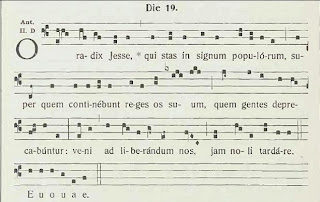Text: Zephaniah 3:14-20 (see below)
Have you ever heard of the O Antiphons?
Most of you probably have never heard of these antiphons used at Evening Prayer before the recitation (or singing) of the Magnificat. And yet if you went to church services yesterday and sang the hymn O come, O come, Emmanuel, you sang an actual paraphrase of the O Antiphons. These antiphons are used only during a seven day period just before Christmas. They are a reminder, a foretaste, of the joyous event which is to occur at the end of this week, the annual observance of the birth of our Lord, Jesus.
The history of the O Antiphons is quite obscure. The first reference dates to the fifth century CE in the writings of Boethius (480-524 CE). Scholars have discovered that these antiphons were sung by the monks of the Benedictine Abbey of Saint-Benoit-sur-Loire near Orlean seven days before Christmas. When I was twenty-three years old, residing in France, and had decided to tour the Loire Valley by bicycle, I had the good fortune of visiting that beautiful Abbey. Researching this post brought back fond memories of an experience long, long ago.
It is clear that by the eighth century, the O Antiphons had made their way to Rome. By this time, their usage was universal so much that the phrase “Keep your O” became a common saying amongst the religious. While not included in the Prayer Books of the Anglican tradition, the O Antiphons are regularly used at Evensong during this last week of Advent.
Each antiphon is a name of Christ, one of his attributes mentioned in Scripture. They are:
December 17: O Sapientia (O Wisdom)
December 18: O Adonai (O Lord)
December 19: O Radix Jesse (O Root of Jesse)
December 20: O Clavis David (O Key of David)
December 21: O Oriens (O Dayspring)
December 22: O Rex Gentium (O King of the nations)
December 23: O Emmanuel (O God With Us)
Today we recite the third antiphon at evening worship: O Radix Jesse.
Latin:
O Radix Jesse, qui stas in signum populorum,
super quem continebunt reges os suum,
quem Gentes deprecabuntur:
veni ad liberandum nos, jam noli tardare.
English:
O Root of Jesse, standing as a sign among the peoples;
before you kings will shut their mouths,
to you the nations will make their prayer:
Come and deliver us, and delay no longer.
These O Antiphons make sense if you know the Hebrew Scriptures for the prophet Isaiah had foretold that a “shoot would sprout from the stump of Jesse” (11:1). Jesse, of course, was the father of David, the King of Israel. The prophecies of Micah had promised that the Messiah would rise up from the house of David and be born in the town of Bethlehem, David’s original home (5:1).
“According to Professor Robert Greenberg of the San Francisco Conservatory of Music, the Benedictine monks arranged these antiphons with a definite purpose. If one starts with the last title and takes the first letter of each one - Emmanuel, Rex, Oriens, Clavis, Radix, Adonai, Sapientia - the Latin words ero cras are formed, meaning, “Tomorrow, I will come.” Therefore, the Lord Jesus, whose coming we have prepared for in Advent and whom we have addressed in these seven Messianic titles, now speaks to us, “Tomorrow, I will come.” So the “O Antiphons” not only bring intensity to our Advent preparation, but bring it to a joyful conclusion.”
Love One Another – Brian
There are only two days left until Saint Thomas’ Day. I hope you are almost finished with your preparations for Christmas so that you may enjoy the remaining days of quiet refreshment with friends, family and most importantly, God.
Broad Concern
Martin Luther King, Jr.
No man has learned to live until he can rise above the narrow confines of his individualistic concerns to the broader concerns of all humanity. Length without breadth is like a self-contained tributary having no outward flow to the ocean. Stagnant, still and stale, it lacks both life and freshness. In order to live creatively and meaningfully, our self-concern must be wedded to other concerns.
Source: quoted in The Heart Has Its Seasons edited by Louis Savary and Thomas O'Connor
Zephaniah 3:14-20
Sing aloud, O daughter Zion; shout, O Israel! Rejoice and exult with all your heart, O daughter Jerusalem! The Lord has taken away the judgments against you, he has turned away your enemies. The king of Israel, the Lord, is in your midst; you shall fear disaster no more. On that day it shall be said to Jerusalem: Do not fear, O Zion; do not let your hands grow weak. The Lord, your God, is in your midst, a warrior who gives victory; he will rejoice over you with gladness, he will renew you in his love; he will exult over you with loud singing as on a day of festival. I will remove disaster from you, so that you will not bear reproach for it. I will deal with all your oppressors at that time. And I will save the lame and gather the outcast, and I will change their shame into praise and renown in all the earth. At that time I will bring you home, at the time when I gather you; for I will make you renowned and praised among all the peoples of the earth, when I restore your fortunes before your eyes, says the Lord.

No comments:
Post a Comment